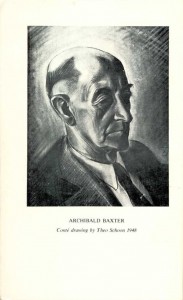Archibald Baxter
Archibald Baxter was a hard working farmer, Catholic and pacifist. In 1915, when he was 33, Baxter was arrested, sent to prison, then as one of 14 conscientious objectors, shipped under guard to France where he was forced to the front line against his will. Punished to the limits of his physical and mental endurance, Baxter was stripped of all dignity, beaten, starved and placed directly in the line of fire. Field Punishment No.1, which Baxter and his fellow conscientious objectors received regularly, included ‘the crucifixion’, in which they were tied to a post, their hands, knees and feet bound and held in this position for up to four hours a day.
In later life Baxter published We Will Not Cease, an autobiography which recounted his experiences as a pacifist. He wrote, ‘Throughout this half century the methods of warfare have steadily become more atrocious. Before the First World War people said to one another: “Warfare belongs to the past. Armies will never meet again with frontal attack in battle. We have too much respect now for human life.” But in fact it has happened otherwise.
A greater barbarism than any the human race had known in the past has risen among the nations. In the First World War multitudes of conscript soldiers were buried alive in the mud of France. Villages were also annihilated. But the greatest number of casualties were among the conscript troops. In the Second World War the wholesale slaughter of civilians, by high explosives, by fire bombing, and finally by atomic weapons, became a matter of course. Reports from the present Vietnam War indicate that eighty per cent, of the casualties are occurring among civilians. War has at last become wholly indiscriminate.
 The military machine is turned against that communal life which is the seed-bed of future generations of mankind. The only apparent justification that war ever had was that by destroying some lives it might clumsily preserve others. But now even that apparent justification is being stripped away. We make war chiefly on civilians and respect for human life seems to have become a thing of the past.
The military machine is turned against that communal life which is the seed-bed of future generations of mankind. The only apparent justification that war ever had was that by destroying some lives it might clumsily preserve others. But now even that apparent justification is being stripped away. We make war chiefly on civilians and respect for human life seems to have become a thing of the past.
To accept this situation would be to accept the devil’s philosophy. And in fact men are not accepting it easily. This book contains the record of my own fight to the utmost against the power of the military machine during the First World War. At that time to be pacifist was to be in a distinct minority. But today—as war, which was always atrocious, becomes more obviously atrocious and anti-human—to be pacifist is to be the spokesman even of a confused majority who have begun to see that, whatever the national issues may be, all wars are deeply atrocious and no war can be called just’.
Further Reading:
Archibald Baxter, We Will Not Cease: The Autobiography of a Conscientious Objector. Christchurch: The Caxton Press, 1965.
David Grant, ‘Baxter, Archibald McColl Learmond 1881 – 1970’, Dictionary of New Zealand Biography, updated 22 June 2007 URL: www.dnzb.govt.nz
